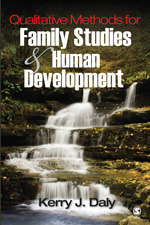Chapter 1: Qualitative Research and the Art of Learning to See
The Paradox of Learning to See
Paradox of Control and our Ability to See
Lessons From the Art World: Positioning Ourselves to See Fully
Drawing Informs Research: The Cultivation of Perceptual Skills
Chapter 2: Epistemological Considerations in Qualitative Research
Epistemology and Paradigms: Implications for Doing Qualitative Research
Chapter 3: Paths of Inquiry for Qualitative Research
Induction, Deduction and Abduction in Practice: Cycles of Inquiry
Chapter 4: Ontology of the Human Realm: Theoretical Foundations for Qualitative Inquiry
Ontology and the Nature of Human Reality
Ontological Assumptions About Human Development
Ontological Assumptions About Families
Chapter 5: Methodology: How Theory Shapes Inquiry
Ethnography and the Study of Culture
Phenomenology: The Study of Conscious Experience
Grounded Theory Methodology
Narrative Inquiry: The Study of Story
Critical Approaches: The Tradition of Feminist Inquiry and the Example of Participatory Action Research
Chapter 6: Methods of Data Collection and Creation
Chapter 7: Research design: Constructing a Research Proposal
What Kind of Chef Are You?
Level I: Philosophical and Methodological Positioning
Level II: Developing a Research Proposal
Overview of the Research Plan: Practical Considerations
Chapter 8: Positioning the Self: Role Considerations and the Practices of Reflexivity
Dimensions of Reflexive Practice
Why Do We Do Reflexivity?
Reflexivity in Family Research
Reflexivity and Social Positioning
Balancing Vulnerability and Researcher Presence
Chapter 9: Analytical Strategies
What is Analysis in Qualitative Research?
Transcription as Part of Analysis
Analytic Approaches in Various Methodologies
The Diamond Approach: A Theory Development Model for Qualitative Data Analysis
Chapter 10: Integrity Practices: Ethics, Credibility and Politics of Conducting Qualitative Research
Protecting Participants Through Confidentiality and Anonymity



